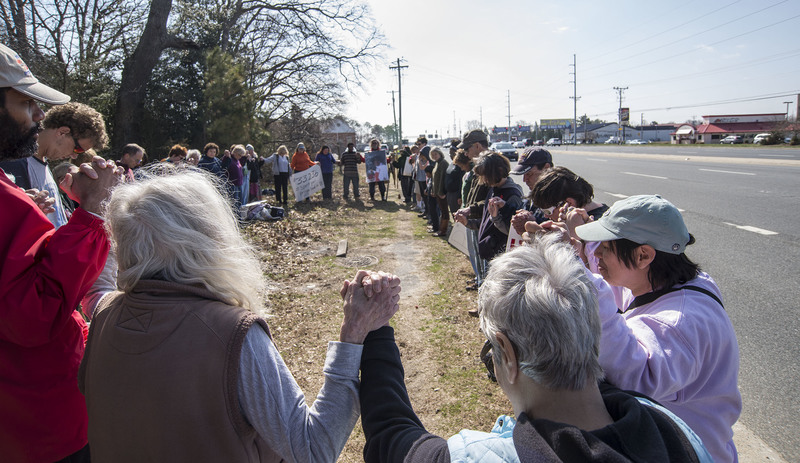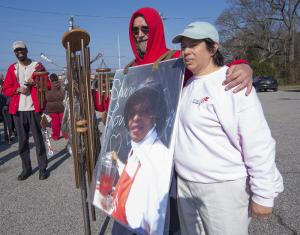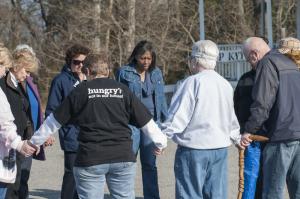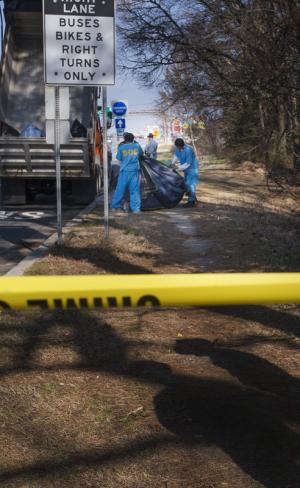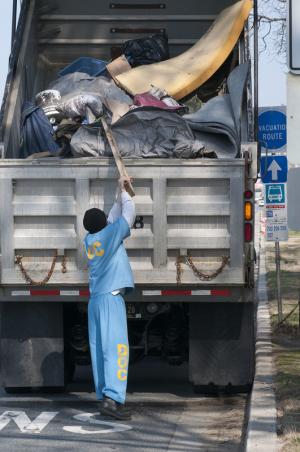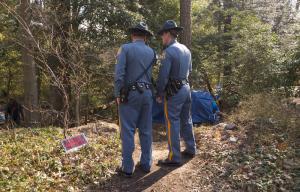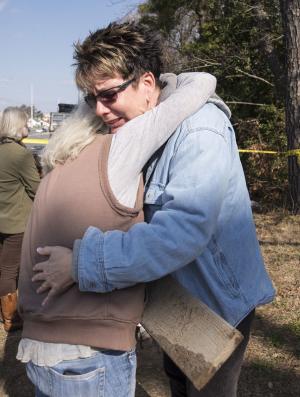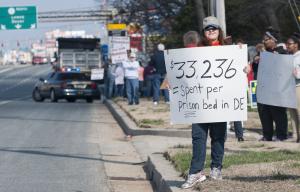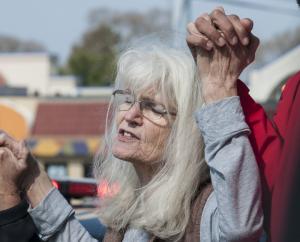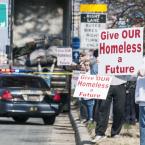Homeless rousted from Route 1 site
Tents and makeshift shelters that for years a number of homeless people in the Cape Region had called home were dismantled April 5.
Black-and-yellow crime scene Do-Not-Cross tape cordoned off the area, and two state troopers watched as Department of Corrections inmates tore down the encampment, located in a wooded area near a local soup kitchen along Route 1.
Troopers also kept an eye on about 50 people who came to support the homeless people, as inmates loaded pieces of old furniture, carpet, cushions and black plastic bags into a dump truck to be hauled to the landfill.
Kevin, a once homeless man credited with starting the makeshift tent city, couldn’t watch. He broke into tears and, with a backpack slung over his shoulder, briskly strode away from the scene toward a nearby cemetery.
Cherith Snyder and Janet Idema coordinated the show of support.
Snyder said they didn’t find out until March 31 that the encampment would be moved. "Evicted, really, because they consider this home,” Snyder said.
Snyder works with SOUL or Serving Others Under the Lord Ministries, of Beth El Tabernacle Church in Frankford. Idema volunteers at Shelter Immanuel at Epworth United Methodist near Rehoboth Beach.
County officials notified the owner of the property, Robert Hood of Snohomish, Wash., in December, giving him 10 days to take action on the camp or face a notice of violation. Hood said in a phone interview that he decided it was time for people in the camp to move on.
Some find new shelter
Snyder she said she picked up seven homeless people April 4: four she took home with her, one was taken to a detoxification center in Ellendale for alcohol-related treatment and two were left on their own.
“I found them using marijuana, and I don’t want that in my home. The others have a drinking problem, but they’re sober now. They’re at home, and my husband is there with them to make sure they remain sober. “We live very far away from any civilization, so they can’t even walk to the liquor store – praise the Lord,” Snyder said.
She said the Rev. Dennis Milner, pastor of Beth El Tabernacle Church, and other church officials would meet this week to plan what should be done next.
The number of people living in the camp has varied.
“There could be anywhere from a core of eight to a group of 20; it depends on the weather and time of year,” Idema said.
Snyder said SOUL ministry goes to a motel in Millsboro on Monday evenings to feed low-income residents living there; they would then bring food to the now dismantled tent city; then go to two places in Ocean City and two in West Ocean City.
“We just feed the homeless and the needy. A lot of times people in low-income housing will just come out and help themselves as well,” Snyder said.
She said they also take homeless people to substance-abuse treatment facilities and help those who need assistance get proper identification so they can get a job.
“On Thursday, we do the same thing in Western Delaware," she said, with stops in Seaford, Laurel and Salisbury, Md. Snyder said in Delaware alone the ministry feeds about 70 people a week.
She said about half of the homeless people she encounters are down on their luck and about half have alcohol or drug abuse problems or are mentally ill.
“That’s something people forget about. If they had the proper avenues they could seek psychiatric help,” she said.
She said for employment purposes, the state’s social service agencies allow homeless people to use the address for the Community Resource Center in Rehoboth Beach as their home address.
“A gentleman, they don’t know who he was, came down to tent city on Monday, and handed them $1,200 cash. That’s the biggest mistake you could ever make,” she said.
She said by Friday, several people who were there when the money came in had spent it all on a hotel room and alcohol.
Snyder said most residents of tent city were men ages 21 through 59.
She said she was shocked to learn that until they became homeless, many did not have substance problems.
“What ends up happening is they need something to take the edge off,” she said.
Synder said she also found out that when homeless people in Dover and Wilmington learned about the tent city, they would migrate to it.
Safe haven safe no longer
“It was because, and this is what was so wonderful about this place, the landowner gave them permission. They had a safe place, and they weren’t breaking the law. They were hidden from view, and people had to make a stink about it and were giving the landowner a hard time,” Synder said.
She said Sussex County administration had been trying to get rid of the encampment for five years.
“I believe it had something to do with the hotel that’s going up,” she said about the building being constructed nearby, from which tent city is visible.
Christian Hudson of Hudson Management Co., said he had nothing to do with the eviction. Reached by phone, he said he offered to hire some of the residents to sweep and do other work, but he never heard back from them.
She said Sussex County doesn’t have a year-round homeless shelter. Crisis House in Georgetown is a good facility, she said, but it limits people to a 30-day stay and has several requirements.
Dave, 52, had been a construction worker until he lost his job. Now back to work, at least temporarily, he lived in tent city and before that he lived behind Kmart on Route 1.
For the next few days, he said he would live in the Community Resource Center near Rehoboth Beach. But after it closes for the season, he doesn’t know where he will live.
To donate money to help homeless people, as well as to donate much needed clothing, toiletry items, bedding and food, phone Bethel Tabernacle Church at 302-632-4289 or Epworth United Methodist Church Immanuel Shelter coordinator, at 302 212-2971.














